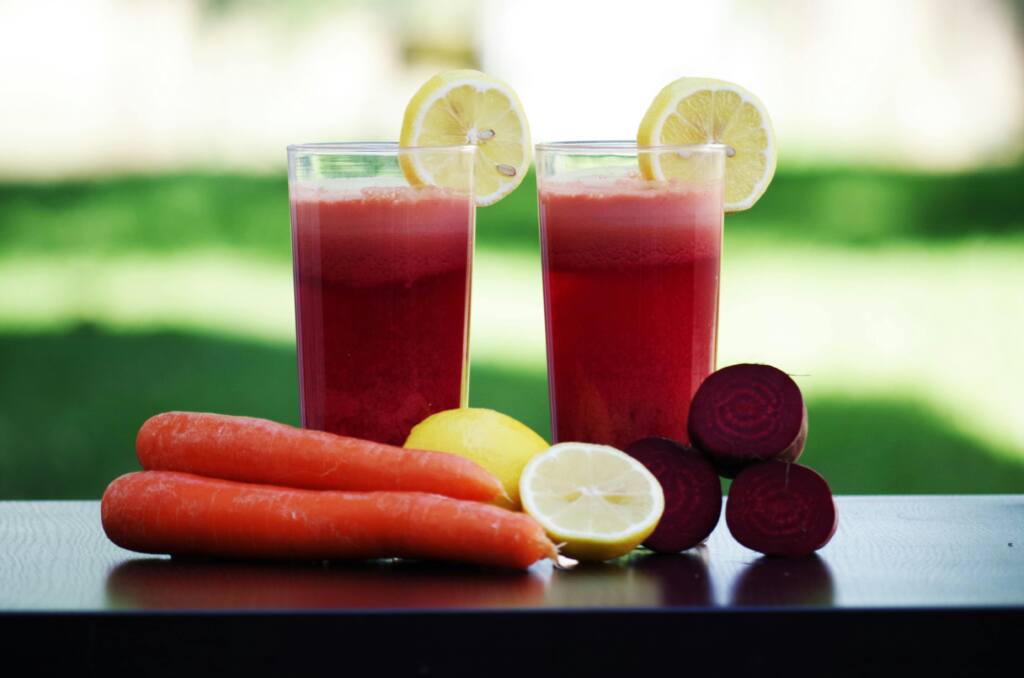“Beet Juice Nutritional Facts”

Beet juice has gained popularity in the health and wellness world for its impressive nutritional profile and potential medicinal properties. This deep red juice, extracted from the root vegetable Beta vulgaris, is a rich source of vitamins, minerals, antioxidants, and bioactive compounds. In this comprehensive analysis, we delve into the functional properties and health benefits of beet juice, backed by scientific research and evidence. We will also explore the different forms of beet juice available, potential side effects and precautions, and tips for incorporating it into a healthy diet. By the end of this article, you will have a thorough understanding of the nutritional facts that are in beet juice and how it can improve your overall health. Let’s dive in!
Key Takeaways:
Beet juice is packed with essential nutrients like fiber, potassium, folate, vitamins A, C, and B6, and minerals like iron, magnesium, and phosphorus.
The antioxidants betalains and nitrates in beet juice help improve blood flow, reduce inflammation, and protect against chronic diseases.
Regular consumption of beet juice is linked to improved cardiovascular health, lowered blood pressure and cholesterol, and enhanced exercise performance.
Beet juice is available in fresh juice, powder, and concentrate forms, each with its own nutritional profile.
While generally safe, beet juice may interact with certain medications and should be consumed in moderation, especially by those with low blood pressure or kidney issues.
Nutritional Profile of Beet Juice
Beet juice is a nutritional powerhouse, packed with various essential nutrients that contribute to its impressive health benefits. One cup of beet juice (250ml) contains approximately:
4 grams of fiber
44% of the recommended daily intake (RDI) of potassium
34% of the RDI of folate
Vitamins A, C, and B6
Minerals like iron, magnesium, and phosphorus
Beet juice is also rich in antioxidants such as betalains, which give beets their vibrant color, and nitrates, which are converted into nitric oxide in the body. These nutrients help improve blood flow, reduce inflammation, and protect against chronic diseases12. Additionally, beet juice is relatively low in calories, with only 70 calories per cup, making it a great option for those watching their calorie intake1.
Medicinal Properties of Beet Juice
Beet juice has been found to possess a variety of potential medicinal properties, making it a popular choice for health-conscious individuals. One of its most well-known benefits is its ability to promote heart health. The high levels of dietary nitrate in beet juice can improve blood vessel function, reduce blood pressure, and prevent harmful blood clots25. Studies have also shown that regular consumption of beet juice can improve exercise performance, making it a popular choice among athletes 39. Additionally, beet juice has been linked to managing chronic diseases such as diabetes and metabolic syndrome, thanks to its anti-inflammatory effects and ability to regulate blood glucose levels.
Forms of Beet Juice
Beet juice is available in various forms, each with its own unique nutritional profile:
Fresh juice: Made from raw beets, this is the most nutrient-dense option.
Beet powder: Made from dehydrated beets, it can be easily added to smoothies or other drinks.
Beet juice concentrates: Highly concentrated forms that may contain added sugars.
When choosing a form of beet juice, consider individual needs and preferences. Fresh juice may be best for maximum nutritional benefits, while powder and concentrates are more convenient for incorporating into meals and snacks. Choose organic, non-GMO options when possible, and read labels to avoid added sugars or additives110.
Potential Side Effects and Precautions
While beet juice offers numerous health benefits, there may be some potential side effects and precautions to consider:
Temporary discoloration of urine (harmless, caused by beet pigment)
Lowered blood pressure (caution for those with already low blood pressure)
Interaction with certain medications (e.g., high blood pressure meds, antiplatelet drugs)
High oxalate content may contribute to kidney stones in susceptible individuals16
Always consult with a healthcare professional before adding beet juice to your diet, especially if you have underlying health conditions or are taking medications.
Tips for Incorporating Beet Juice into a Healthy Diet
Add it to your morning smoothie
Use it as a salad dressing mixed with olive oil, lemon juice, and herbs.
Incorporate it into soups and stews for added flavor and nutrition.
Swap out sugary drinks with beet juice for a healthier alternative.
Get creative with recipes like baked goods or marinades110
Remember to consume beet juice in moderation and consult with a healthcare professional if you have any concerns.
Conclusion
In conclusion, beet juice is a nutritional powerhouse that offers a wide range of health benefits. Its rich nutrient profile, including vitamins, minerals, and antioxidants, makes it a valuable addition to one’s diet. Through its potential medicinal properties, such as promoting heart health and managing chronic diseases, beet juice has gained attention from health experts and researchers.Whether consumed in fresh juice, powder or concentrate form, beet juice provides numerous health benefits.
However, as with any food or supplement, moderation is key. It is important to consult a healthcare professional before incorporating beet juice into your routine, especially if you have pre-existing health conditions. With its versatile uses in cooking and its impressive benefits for human health, beet juice is certainly worth considering as a part of a healthy diet. We hope this comprehensive analysis has shed light on the potential of beet juice and its valuable role in promoting overall well-being.
https://7thavewellnessblog.com/?p=2825
Frequently Asked Questions
What are the key nutrients in beet juice?
Beet juice is rich in fiber, potassium, folate, vitamins A, C, and B6, as well as minerals like iron, magnesium, and phosphorus. It also contains powerful antioxidants like betalains and nitrates12.
How does beet juice benefits heart health?
Beet juice has high nitrate. It can improve blood vessels and lower blood pressure. It also prevents harmful clots. So, it promotes heart health. 25.
Can beet juice aid in athletic performance?
Yes, studies have shown that drinking beet juice can improve exercise performance. It can also improve endurance. This has made it popular among athletes.
Is beet juice beneficial for digestion?
Beet juice has lots of fiber. Fiber helps: digestion, reduces hunger, and makes you feel full.
Are there any precautions to consider when consuming beet juice?
Yes, beet juice may interact with some medications. It can lower blood pressure and cause kidney stones in people at risk, due to its high oxalate content. Always ask a healthcare professional before adding beet juice to your diet. This is especially true if you have health conditions or are taking medications.







